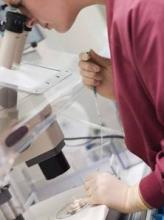The best candidates for ovarian tissue freezing are children, "because it’s not possible to stimulate the ovaries of a girl who hasn’t gone through puberty yet," Dr. Gracia said. "That’s really the only option they have. We also offer it to patients who are at extremely high risk for going through ovarian failure or infertility, like patients who need to get transplants or those who receive high doses of alkylating agents."
Fears of Recurrence
Some breast cancer patients ask Dr. Karine Chung, director of the Fertility Preservation Program at the University of Southern California, Los Angeles, if fertility treatments or becoming pregnant will increase the risk that the cancer may return. She tells them that "while theoretically it is a concern that becoming pregnant after breast cancer could increase the rate of recurrence, there have been a number of very well-designed, large studies that have shown that that is not the case."
"As far as whether going through IVF or ovarian stimulation increases the risk of recurrence, we don’t think so. There is very limited data looking at that, but if you compare what happens during an IVF cycle and what happens during pregnancy, an IVF cycle is a very short period of time in which a woman is exposed to high levels of estrogen, whereas pregnancy is a relatively long time in which a woman is exposed to high levels of estrogen. If pregnancy has not turned out increased recurrence, we don’t think that IVF will, either," she said.
Dr. Alison W. Loren, fellowship program director in the division of hematology/oncology at the University of Pennsylvania, Philadelphia, tells her hematology patients that there is "really no increased risk of recurrence of blood cancers, if they choose to become pregnant after their cancer treatment."
On the other hand, women who have hormone receptor–positive cancers "are generally counseled to wait at least 5 years after their cancer treatment is complete to become pregnant, but that’s not evidence based. There are concerns in cases where the fertility window is shortened. For example, if you advise a 32-year-old woman to wait 5 years after her last cancer treatment to get pregnant, you could be jeopardizing her ability to get pregnant."
Increased recurrence rates for certain types of cancer following fertility preservation were reported at the March 2102 annual meeting of the Society of Gynecologic Oncology in Austin, Tex. A study from Japan reported a recurrence rate of 24% after use of high-dose medroxyprogesterone acetate in young patients with endometrial cancer. The total number of pregnancies was 42; delivery outcomes were 19 normal deliveries, 11 cesarean sections, 2 premature deliveries, 5 spontaneous abortions, 2 induced abortions, 1 unknown, and 2 ongoing pregnancies (Gynecol. Oncol. 2012;125;S5 [doi: 10.1016/j.ygyno.2011.12.006]). A separate, multicenter study in the United States found that the risk of recurrence in patients with serous borderline ovarian tumors was 35% among patients who underwent fertility-sparing surgery, compared with 15% in other patients; at least 7 healthy infants were delivered (Gynecol. Oncol. 2012;125;S5 [doi: 10.1016/j.ygyno.2011.12.007]).
The data have not yet been published in a medical journal except as meeting abstracts, however, and Dr. Loren was reluctant to comment until more information becomes available.
Cost Can Be an Obstacle
Insurance rarely covers the cost of fertility preservation for cancer patients, and the costs can reach $20,000. Fertile Hope’s Sharing Hope Program for Women, an initiative of the Lance Armstrong Foundation, invites cancer patients to apply for discounted services and donated medications (www.fertilehope.org). Eligibility requirements include being a U.S. citizen or permanent resident with an annual household income of less than $75,000 (single) or $100,000 (married), and having not yet started fertility-damaging cancer treatments.
Other resources for patients include Fertile Action (http://fertileaction.org), which was founded by a breast cancer survivor, and MyOncofertility.org (http://myoncofertility.org), an education resource provided by the Oncofertility Consortium.
Who Has Expertise in Fertility Preservation?
New guidelines from the National Comprehensive Cancer Network establish young adult and adolescent cancer patients as a distinct group whom oncologists should routinely send for fertility counseling. Will they?
Oncologists are not necessarily knowledgeable about the options or in the habit of referring patients to reproductive endocrinologists or other clinicians who specialize in fertility, according to Dr. Chung.
"Because [the oncologists’] knowledge of fertility and ovarian function in general is somewhat limited, to have a meaningful discussion about fertility preservation options with these patients is difficult," she said.
The American Society of Clinical Oncology (J. Clin. Oncol 2006:24:2917-31). and the American Society for Reproductive Medicine (Fertil. Steril. 2005;83:1622-8) have previously recommended that all women be offered counseling and an opportunity to preserve their fertility before cancer therapy, but implementation appears to be mixed.


